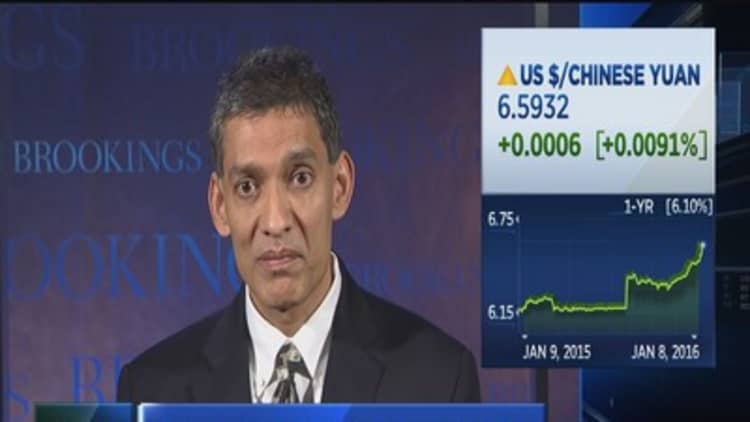
The new year has been off to a rocky start for Wall Street, with the Dow, and Nasdaq ending the week down more than 6 percent. Some investors are wondering if the U.S. is headed into bear market territory, while others hold that the fear is overblown.
"I'm still very bearish. I'm bearish on stocks, I still think we have a bubble," Tice Capital's president, David Tice, said Friday on CNBC's "Power Lunch." He thinks markets could fall as much as 30 or 40 percent over a period of six to 18 months.
The U.S. market slump follows Thursday's worrisome day for China when the country halted trading after a 7 percent market plunge. The epicenter of the market earthquake was Beijing's decision to devalue the yuan by 0.5 percent to 6.5646 per dollar.
"There needs to be a set of macroeconomic measures, monetary and fiscal policy to support the economy and some confidence-building measures in terms of economic reforms," said Eswar Prasad, senior fellow at the Brookings Institution and a Cornell University professor, on "Power Lunch" on Friday.
Stock market and supply-side reforms should be key steps moving forward for China, according to Prasad.

Some analysts say that global market fears over China are overblown, citing Friday's strong U.S. jobs report. The domestic economy added 292,000 nonfarm payrolls in December, according to the most recent Bureau of Labor Statistics report, soaring past the expectation of 200,000 by analysts.
"There has been some concern we might be slipping into a recession and the very, very strong jobs number today really suggests we're not," said Burns McKinney, portfolio manager at NFJ Investment Group, said on "Power Lunch."
In fact, investors should "buy the dip," according to McKinney and Wells Fargo Investment Institute senior global equity strategist Scott Wren.
"You know, it's been an ugly start, but investors are going to be a lot more happy in 2016 than they were in 2015," Wren said on "Power Lunch," adding that investors will likely see better performance from Japan and the euro zone.




